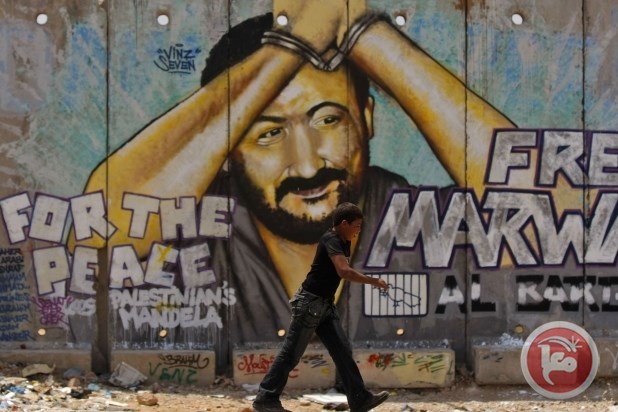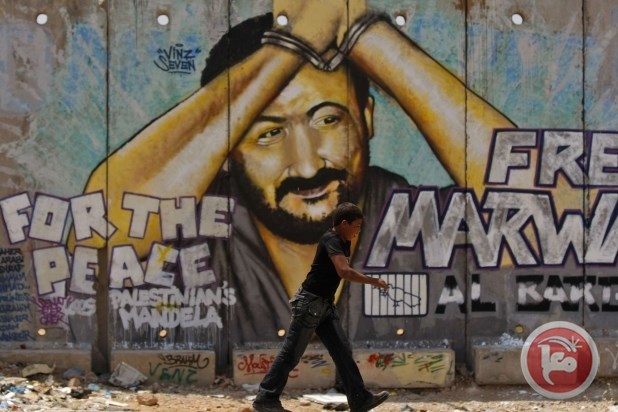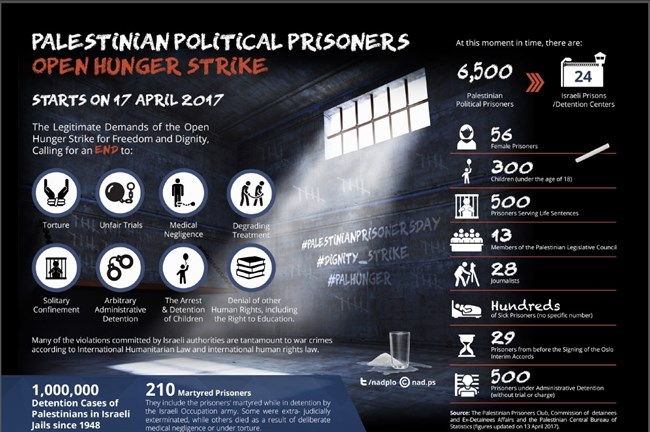Ma’an News Agency | – –
BETHLEHEM (Ma’an) — Activists and commentators have denounced the dishonesty of Israeli criticism of The New York Times for publishing an op-ed in defense of a mass hunger strike underway in Israeli prisons, in light of rampant impunity for Israeli officials who commit crimes or incite violence against Palestinians.
 Ma’an. File.
Ma’an. File.
In an article for the prominent US newspaper, imprisoned Palestinian leader Marwan Barghouthi wrote of “an unbelievable state of affairs” in Israeli prisons, noting that “over the past five decades, according to the human rights group Addameer, more than 800,000 Palestinians have been imprisoned or detained by Israel — equivalent to about 40 percent of the Palestinian territory’s male population.
“Today, about 6,500 are still imprisoned, among them some who have the dismal distinction of holding world records for the longest periods in detention of political prisoners. There is hardly a single family in Palestine that has not endured the suffering caused by the imprisonment of one or several of its members,” he wrote.
Barghouthi could face prosecution for writing the piece, and has since been placed in solitary confinement and barred from receiving visits from his lawyers.
A number of Israeli officials slammed The New York Times for not referring to Barghouthi — who is one of the most popular political figures among Palestinians — as a “terrorist” and “murderer of Israeli civilians,” although the American newspaper later amended the article to include the charges of which Barghouthi was found guilty by Israel.
“The paper recanted after we pointed it out to them,” Israeli Prime Minister Benjamin Netanyahu boasted, saying that referring to “archterrorist” Barghouthi as a “parliamentarian and leader” was “like calling Assad a ‘pediatrician'” — referring to Syrian President Bashar al-Assad, a former doctor who has been accused of overseeing war crimes and crimes against humanity against Syrian civilians.
Deputy Minister for Diplomacy in the prime minister’s office Michael Oren went a step further, and suggested that The New York Times’ bureau in Jerusalem be closed.
Israeli peace activist group Gush Shalom was quick to point out the hypocrisy of labeling Palestinian resistance fighters as “murderers of terrorists,” while Israeli military and political figures who have historically committed mass atrocities against civilians are revered and respected in mainstream Israeli society.
The group noted that, as Barghouthi was sentenced to five life terms in prison, by the same token Menachem Begin, Israel’s sixth prime minister, deserved to be sentenced to at least 91 consecutive life terms for his role commanding the militant Zionist Irgun movement, which notably carried out a 1949 bombing in Jerusalem that left 91 people dead.
The group also noted the injustice in Israeli prison authorities allowing “cruel (Israeli) murderers and leaders of crime gangs” to use public telephones in criminal prison wings, while denying the right to so-called security prisoners, namely Palestinian political prisoners — one of the injustices the hunger strike led by Barghouthi seeks to address.
“In themselves, most demands of the hunger-striking Palestinian prisoners are simple and elementary, and there is no reason to reject them,” Gush Shalom affirmed.
Gush Shalom’s sentiment was echoed by columnist for Israeli daily Haaretz and Army Radio interviewer Ravit Hecht, who was skewered in Israeli media for comparing Barghouthi to fighters in Zionist militias.
“You know the history of Israel and our existence. Did you know that all the underground freedom fighters were heinous murderers in the eyes of the other side? You don’t see any parallels here?” Hecht posited in an interview with Israeli Tourism Minister Yariv Levin.
Furthermore, while The New York Times caved to pressure from Israeli leadership to amend the article, the opinion section of the American newspaper has, on multiple occasions, “provided a platform for several Israeli op-ed contributors who committed acts of terrorism or war crimes, without acknowledging that fact,” founder of the Tel Aviv-based news commentary site 972 Magazine Lisa Goldman noted.
“It seems that The New York Times is willing to publish op-eds by Israeli Jews who advocate or have committed murder of Palestinians, without mentioning that fact in their bio blurbs. So the question, without taking a position on whether or not political violence is ever justified, is why the Times feels compelled to take a different stance when it comes to Palestinian contributors,” she wrote.
Israel’s outright rejection of the term “political prisoner” in favor of labeling imprisoned Palestinians as violent terrorists contrasts with a more nuanced intellectual debate over the legitimacy of armed Palestinian resistance, which challenges equating state violence with an armed struggle against military occupation.




 © 2025 All Rights Reserved
© 2025 All Rights Reserved